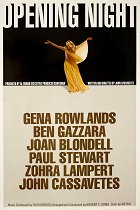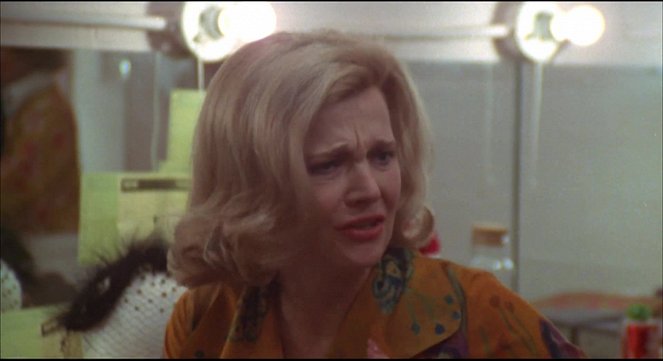Rendező:
John CassavetesForgatókönyvíró:
John CassavetesOperatőr:
Al RubanSzereplők:
Gena Rowlands, John Cassavetes, Ben Gazzara, Joan Blondell, Paul Stewart, Zohra Lampert, John Tuell, Laura Johnson, Peter Bogdanovich, Seymour Cassel (több)Tartalmak(1)
Lelki válságba kerül az új darab próbája közben a híres színésznő. Myrtle Gordon nehezen viseli az öregedéssel járó megpróbáltatásokat, még nehezebben, hogy egy ilyen nőt kell a színpadon is alakítania. Se családja, se kutyája, a barátai és az ismerősei is elmaradoztak mellőle. Már csak a színpad maradt neki, ahol estéről estére ő van a reflektorfényben. Miután szemtanúja lesz egy rajongója tragédiájának, az ereje végleg elhagyja, az idegei felmondják a szolgálatot. Részegen érkezik a premierre. A színpadon Myrtle rögtönözni kezd, és végül a saját drámáját játssza el a nézők előtt. (Örökmozgó)
(több)Recenziók (3)
Lélektani dráma színházi miliőből egy sikeres színésznőről, aki azzal küzd, hogy megbarátkozzon az idősebb kortól szenvedő nő karakterével. És azokról az emberekről, akik vele együtt dolgoznak a szóban forgó színdarabon. John Cassavetes rendező és forgatókönyvíró színpadias, vizuálisan egyszerű. A karaktereket tisztán fogalmazza meg, és sokat merít a belső terek színeiből, amelyekben a film játszódik. A film középpontjában Gena Rowlands bravúros alakítása áll, akinek köszönhetően szó szerint fetisisztikus élmény voyeur módra belemerülni karaktere bonyolult mentális és pszichológiai állapotába. Pszichológiai remekmű a film és a színház szerelmeseinek!
()
John Cassavetes, the uncrowned king of the American independent scene, gives a glimpse into the inner workings of an ageing stage actress who doesn't have to fight any inner demons, but herself. And it's 144 minutes long, so if you don't feel beforehand that the subject matter is something for you, you'd better keep your hands off Premiere. [KVIFF 2022]
()
Cassavetes works excellently with the audience. Thanks to the intertwining of the main character's real life with the role she is portraying, which is mentally destroying her and against which she is trying to defend herself, we are constantly kept in suspense through real theater performances, rehearsals, and glimpses into the personal life of the aging actress. We, in my case, try to recognize who is actually speaking to us (I was holding my breath) during this tension. Is it the real woman-actress, trying to cope with the character she is playing and thus also dealing with herself? Or are these just prescribed words from her part (which, by the way, the author of the play - also an aging woman - could be speaking)? Is it an instant improvisation or rehearsed words? Although the ending is not as catastrophic as the previous almost two and a half hours, Cassavetes as a director and actor and Gena Rowlands deserve the utmost.
()

